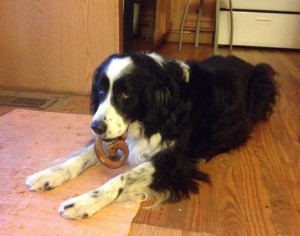
Having a dog with separation anxiety can be a huge financial, safety, and emotional stress. It is so much easier to prevent, prevent, prevent, than fix it. Sometimes owners don’t even realize they are setting their dog up to be anxious when left alone until it’s too late. Here are some ways you can set your dog up to be happy and confident, and keep that terrible anxiety away.
1. Exercise! Make sure your dog always has plenty of physical and mental exercise. A tired dog is a happy dog is a happy owner. Burning off excess energy leaves you with a nice calm dog when you leave. Teaching your dog commands and tricks is also a great way to mentally stimulate them.
2. Don’t feel like you have to spend every waking moment with your dog. Make time during the day for “down time” – it doesn’t have to be hours and hours – but just a break so your dog gets used to being alone.
3. Don’t make a big deal out of leaving. When you leave, if you want to give your pup lots of love and pets, do it 30 minutes before you leave, then gather your things up, and leave calmly. If you give your dogs tons and tons of attention while they are over the top excited, and then you suddenly leave, it makes it much harder for the dog to deal with you being gone.
4. Same goes for coming back home – walk into your house calm and confident. If your dog is going crazy jumping and dancing to see you, keep going about your business, greet your family, set your things down, totally ignoring the dog until they are calm. Then when that energy is down, call them over and love on them like crazy! Always be aware of what state of mind you are rewarding.
5. Give your dog something to do when you leave so you leaving is actually fun and rewarding! A stuffed kong, knuckle bone, antler, or any other safe heavy duty treat that will last a long time will keep your dog busy while you’re gone.
6. Socializing to new places can be a huge help in boosting your dog’s confidence. Going new places not only gets them used to new things, but also tires them out more. This increases their confidence in you, seeing that you can take care of yourself and them. If your dog knows commands, or even fun tricks, do them while you’re out and about in new places.
7. If you do all these things with your dog but still seem to be having a hard time with constant anxiety, panting, whining, or excessive drooling, it may be time to talk to a professional trainer/behavior consultant to diagnose the anxiety properly and get additional tools under your belt.
Kersti Nieto
Certified Dog Trainer
K9 Solutions LLC
http://www.nck9solutions.com
